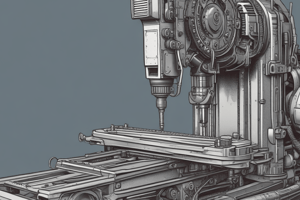Podcast
Questions and Answers
What significant development did Eli Whitney introduce in 1814 regarding milling machines?
What significant development did Eli Whitney introduce in 1814 regarding milling machines?
- The universal milling machine
- Interchangeable parts for mass production (correct)
- Computer Numerical Control (CNC) technology
- Advanced rotary cutting techniques
How did the universal milling machine created by Brown & Sharpe in 1861 impact the machine tool industry?
How did the universal milling machine created by Brown & Sharpe in 1861 impact the machine tool industry?
- It introduced CNC technology.
- It contributed to the growth of the machine tool industry. (correct)
- It reduced the need for interchangeable parts.
- It limited the complexity of parts produced.
What is a primary example of a milling machine mentioned in the content?
What is a primary example of a milling machine mentioned in the content?
- CNC machine
- Lathe
- Universal milling machine
- Bridgeport milling machine (correct)
In which century did Computer Numerical Control (CNC) milling machines transform the industry?
In which century did Computer Numerical Control (CNC) milling machines transform the industry?
What foundational aspect did milling machines contribute to in modern manufacturing?
What foundational aspect did milling machines contribute to in modern manufacturing?
What was a notable impact of milling machines on various industries?
What was a notable impact of milling machines on various industries?
Which industries notably benefited from the advancements of milling machines?
Which industries notably benefited from the advancements of milling machines?
Milling machines became important during which historical period?
Milling machines became important during which historical period?
What characteristic of milling machines allowed them to support mass production?
What characteristic of milling machines allowed them to support mass production?
What was one of the innovations provided by milling machines that influenced technological advancements?
What was one of the innovations provided by milling machines that influenced technological advancements?
Flashcards
Milling Machines
Milling Machines
Machines that use rotary cutters to shape materials precisely, often used in industries like aerospace and automotive.
Interchangeable Parts
Interchangeable Parts
The process of producing standardized parts that can be exchanged for each other, making assembly faster and easier.
Eli Whitney's Milling Machine
Eli Whitney's Milling Machine
The first commercially successful milling machine, created by Eli Whitney in 1814, paved the way for mass production with its ability to create interchangeable parts.
Universal Milling Machine
Universal Milling Machine
Signup and view all the flashcards
Brown & Sharpe Milling Machine
Brown & Sharpe Milling Machine
Signup and view all the flashcards
Computer Numerical Control (CNC) Milling
Computer Numerical Control (CNC) Milling
Signup and view all the flashcards
Bridgeport Milling Machine
Bridgeport Milling Machine
Signup and view all the flashcards
Mass Production
Mass Production
Signup and view all the flashcards
Machine Tool Industry
Machine Tool Industry
Signup and view all the flashcards
Industries Impacted by Milling Machines
Industries Impacted by Milling Machines
Signup and view all the flashcards
Study Notes
Milling Machine History
- Milling machines shape raw materials into precise forms
- They use rotary cutters to remove material from a workpiece
- Example of a milling machine is the Bridgeport mill
- Milling machines have a rich history, dating back to the Industrial Revolution
- They played a pivotal role in mass production
Milling Machine Components
- Motor (Head/Drive): Power source
- Monitor/Swivel (Turret): Control panel/rotating part
- Quill Feed: Mechanism that feeds the workpiece
- Handwheel: Used for adjustments
- Quill: Part of the quill feed
- Spindle: Rotates the cutters
- Worktable/Saddle: Supports and moves workpiece
- Cross Traverse Handwheel: Used for horizontal movement
- Knee: Supports the column, allowing vertical movement
- Column: Part of the machine's structure
- Base: Foundation of the machine
Evolution of Milling Machines
- 1814: Eli Whitney produced the first commercially successful milling machine
- 1861: Brown & Sharpe created the universal milling machine
- 20th Century: Computer Numerical Control (CNC) milling machines transformed the industry
- Interchangeable parts became a basis for mass production
Impact on Industries
- Milling machines revolutionized production by allowing for precise, efficient shaping of materials
- Standardized parts, accelerating manufacturing and assembly processes
- Contributed to the growth of industries (textiles to transportation)
- CNC milling machines boosted accuracy and efficiency in aerospace, automotive, and medical devices
Types of Milling Machines
- Vertical milling machine
- Horizontal milling machine
- Universal milling machine
- Rotary milling machine
Studying That Suits You
Use AI to generate personalized quizzes and flashcards to suit your learning preferences.





